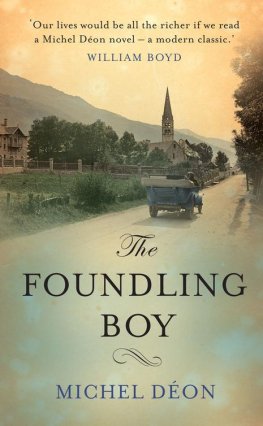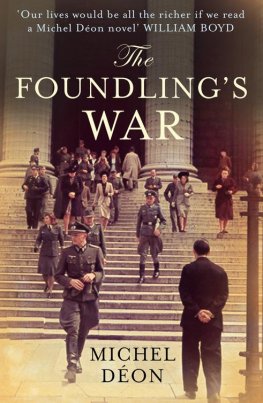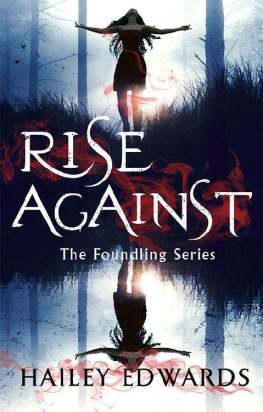Michel Don
The Foundling Boy
Jeanne could not find a way through the hawthorn hedge. The stiff branches slashed at her face and arms. She ran along the path in the hope of finding an opening, but the hostile, aggressive hedge was impenetrable. Clasping her large barren bosom with both hands to stop it bouncing, she felt her hearts panic-stricken thumping as a sharp pain under her left palm. But she could not give up. Behind the hedge, in the young birch forest, a child was wailing, and its fitful cries, carried on the evening air, were calling for her help. She badly wanted to rescue the baby lost in the wood, but her heavy legs felt glued to the earth and her lungs were failing her. She gasped for breath. If she did not hurry up, the child would die and Albert would never forgive her. What made her panic most was that, although she must have run the best part of a kilometre to try to find a way through, the cries were as close as ever, as if the baby was following her behind the hawthorns. Then she realised that the path must go in a circle around the wood, whose dappled foliage was rustling in the fading light. The wailing broke off, and Jeanne stopped, paralysed by fear, with such a lump in her throat that when she tried to call out, only a croak passed her lips.
Whats the matter? Albert said.
A strong hand, with its calloused palm, squeezed her arm, and Jeannes anxiety vanished. She opened her eyes onto the darkness of the bedroom, made out its shape and the position of the window, saw the curtains stir in the breeze. Alberts thumb stroked her forearm with a reassuring gentleness.
Theres a baby crying, she said.
No there isnt, its nothing go back to sleep.
There is, there is, I promise you. Listen.
They stopped talking and heard nothing, and then there was a wail from somewhere close by, weaker than in Jeannes dream, a last exhausted whimper.
Oh, Albert said. Youre right! It sounds like an injured hare.
Im sure its a baby.
At this hour outside our window?
He had a literal mind that had no room for anything unexpected. Jeanne sat up in bed, listening intently. There was another plaintive, desperate wail.
Maybe its Old Souillets crow. It imitates anything that moves.
Im going to see, Jeanne said, stretching out her hand to grope for the sulphur matches on the bedside table.
The Pigeon lamp gave out a gloomy, yellowish glow that shed almost no light. Jeanne adjusted the wick, put a dressing gown on over her nightdress, and went down the wooden staircase. The house had two entrances, one opening into the park, the other onto the road. Without hesitation, Jeanne went to the door to the road and opened it. A wicker basket sat in the middle of the steps, festooned with ribbons. Her hand made contact with a wool blanket. Bringing the Pigeon lamp closer, she saw a minuscule face screwed up against its glimmer. The baby gave a weak cry and its mouth twisted up.
Jesus! Mary! It is a child! Come down quick, Albert.
She forgot that Albert could not come down quickly. He had only one good leg and needed time to strap on the other wooden one, pull on a pair of trousers and grip the banister, step by step.
Are you sure? she heard him shout from upstairs.
Am I sure? Listen to you!
Bring it up then, and well see. Is it just one?
Only then did she think to look up and down the road, but the dark night only revealed what she knew already: a bend to the right, another to the left, the hawthorn hedge opposite. A light, almost warm breeze caressed the shapes of the shadows. A few stars twinkled in the sky. The moon was not yet up. On windy nights you could hear distinctly the waves buffeting the cliffs, but tonight the sea was calm and far away, as if blotted out by the summer night. Jeanne cautiously picked up the basket and carried it to the bedroom. Albert was waiting in his nightshirt, sitting on the edge of the bed with one leg dangling, holding a paraffin lamp.
So you were right. It is a baby, he said, stroking his thick moustache.
He cant be more than a week old.
She lifted the baby out of the basket and brought him closer to the lamp. A warm blue shawl tied with ribbons enveloped him. Next to him someone had placed a full bottle, a hairbrush, a tin of talcum powder and a sealed envelope that Albert opened. I was born on 16 August. I dont have a name. You can find one for me if you want me to stay with you.
The bottles cold. You look after him while I warm it up, Jeanne said, with the decisiveness that characterised her at important moments.
She placed the baby in Alberts arms. Never having held a child in his life before, he was petrified, and he remained sitting on the edge of the bed, his good leg sticking out, bare, hairy and muscular. He had not moved an inch when Jeanne came back and relieved him of his burden.
Hes a nice boy, anyway, he said.
The babys mouth opened wide and clamped shut on the teat. Air bubbles rose in the bottle as its level dropped. Twice Jeanne gently took the bottle away from him to burp him by patting him on the back. Albert, bending over him, received a blast of sour milk smell full in his face. In a cupboard Jeanne found some baby clothes that had been used nineteen years before, for Genevive. She undressed the baby, washed, talced and re-dressed him.
Hes a handsome boy, she said, with an approving nod, referring to what she had just uncovered and covered up again, as though long experience and many patient measurements entitled her to identify a promising future.
He was hardly wrapped up again before he fell asleep, his fists closed, as two anxious faces bent over him: Jeannes round and moon-like, with small grey eyes marked with crows feet and a chin adorned with a small polyp, Alberts long and hollow-cheeked, eyes yellowed by caporal tobacco smoke and calvados fumes, and a thick greying moustache as stiff as a brush.
These loving, anxious faces were the first to imprint themselves on the visual memory of the small boy who was christened Jean and took the name of his adoptive parents: Arnaud. Exactly as in a fairy tale, Albert and Jeanne placed gifts in his basket-cradle, the only possessions in which they were rich: courage and goodness, uprightness and charity, all the qualities that were largely responsible for Jeans later misadventures and for the opinion, partly false, that he formed of the rest of humanity. I say partly false because from his childhood onwards he also met with spite, hypocrisy and mistrust, of which wiser fairies might have thought to inculcate an instinctive recognition in him. But we know that evil always surprises, and it is trusts task to be disappointed. Jean opened his eyes onto a marvellous world, filling his lungs with the air of peace and freedom, a world where the brave were rewarded and the guilty pardoned. A great epoch was dawning. There would no longer be need of soldiers: Albert, along with many other veterans, was seeing to it, and of all the politicians who held forth in those years he listened to, and read, with most warmth and emotion those who promised an end to those wars for which men departed joyously, flowers in their rifle barrels, and from which they returned with a wooden leg where their left leg had been. I forgot to mention that Jean was born in the year of the treaty of Versailles, 1919; that since our first sentence we have been in Normandy the hawthorns, the sound of sea against cliffs; and that Alberts leg was left behind in the mud at Verdun in the course of one of those futile attacks that some generals seem to have a knack for. Among the other faces that offered themselves to Jeans wide-eyed surprise, let us note immediately:
Monsieur du Courseau, owner of La Sauvet, of which Albert and Jeanne were the caretakers; Madame du Courseau, ne Mangepain, who, the morning after the boy first appeared, had returned from a journey to Menton where her daughter Genevive, nineteen years of age, was being treated for her lungs; Antoinette du Courseau, four years old (a home leave of Monsieur du Courseaus after the battle of Les parges); Michel du Courseau, two years old (another leave of Monsieur du Courseaus, before embarking for Salonika); Captain Duclou, Jeannes uncle and one of the last Cape Horners; Monsieur Cliquet, retired railway employee, Alberts cousin; and last but not least Monsieur the abb Le Couec, parish priest of Grangeville, a Breton exiled to Normandy by higher authorities nervous of his separatist fancies. This was not, we must acknowledge, a particularly large universe, but Jean could have fared worse, knowing only until he finally left for military service narrow-minded parents, an imbecilic schoolmaster, a numbingly dull priest, and a country house made gloomy by constipated proprietors.There are, actually, a couple of truly constipated characters lurking in this list. It will be clear who I mean in time. I prefer not to be specific, because it is after all possible that their attitudes will not seem constipated to readers of this story and may even be applauded by a silent majority. I am happy nevertheless to reveal that I am not talking about Monsieur du Courseau, whom Jeanne ran to inform as soon as it was light, pushing the baby into Alberts arms and leaving him both paralysed by his responsibilities and furious at being forbidden to smoke his pipe in any room where little Jean was.








